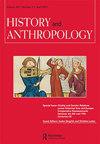Diasporic convergence, sustained transience and indifferent survival: Indian traders in China
IF 0.4
2区 历史学
Q3 ANTHROPOLOGY
引用次数: 0
Abstract
ABSTRACT This paper analyses the way in which Sindhi traders – one of the largest Indian diasporic populations in Asia – have managed to live and work in China as de facto migrants despite their inability to be granted settled immigration status by the Chinese state. Drawing on long-term fieldwork that started in 2010, the paper offers a China-centric ethnographic perspective on how Indian traders, particularly Sindhis in the Chinese county of Keqiao, have been dealing with the incongruence between immigration policies that largely preclude the possibility of their permanent residency and their long-term entrepreneurial engagement in China. I argue that this incongruence, despite the tensions and uncertainties it continues to generate, has in fact become a crucial factor in stabilizing the diasporic convergence upon Keqiao by Sindhi traders. The eventual consequence is what I call ‘indifferent survival’: that is, the Sindhi traders, a group of non-white foreigners, are managing to stay together and even expand the size of their diasporic community in China despite their vast internal differences in class, local knowledge, and wealth.散居的融合、持续的短暂和冷漠的生存:在中国的印度商人
本文分析了信德商人——亚洲最大的印度流散人口之一——在中国作为事实上的移民生活和工作的方式,尽管他们无法获得中国政府的定居移民身份。从2010年开始的长期田野调查中,本文提供了一个以中国为中心的民族志视角,研究印度商人,特别是中国柯桥县的信德人,如何处理移民政策之间的不一致,这些政策在很大程度上排除了他们在中国永久居留的可能性,以及他们在中国长期创业的可能性。我认为,这种不一致,尽管它继续产生紧张和不确定性,实际上已成为稳定信德商人在柯桥的散居聚集的关键因素。最终的结果是我所说的“冷漠的生存”:也就是说,信德商人,一群非白人外国人,尽管他们在阶级、当地知识和财富方面存在巨大的内部差异,但他们仍设法团结在一起,甚至扩大了他们在中国的散居社区的规模。
本文章由计算机程序翻译,如有差异,请以英文原文为准。
求助全文
约1分钟内获得全文
求助全文
来源期刊

History and Anthropology
Multiple-
CiteScore
1.80
自引率
0.00%
发文量
41
期刊介绍:
History and Anthropology continues to address the intersection of history and social sciences, focusing on the interchange between anthropologically-informed history, historically-informed anthropology and the history of ethnographic and anthropological representation. It is now widely perceived that the formerly dominant ahistorical perspectives within anthropology severely restricted interpretation and analysis. Much recent work has therefore been concerned with social change and colonial history and the traditional problems such as symbolism, have been rethought in historical terms. History and Anthropology publishes articles which develop these concerns, and is particularly interested in linking new substantive analyses with critical perspectives on anthropological discourse.
 求助内容:
求助内容: 应助结果提醒方式:
应助结果提醒方式:


